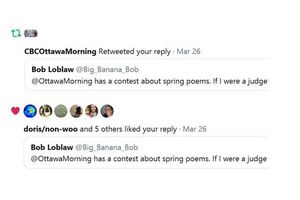Poetry and garbage collection
 About a decade ago, in a friendly local writer's forum, I challenged the merits of poetry and questioned if it had any significant impact on our community. My commentary arose out of a local debate as to whether or not the City of Ottawa should have a publicly-funded poet laureate. Almost thirty years of rationality was abandoned two years ago when the City opted to resurrect the paid position and install the dunsil. Don't get me wrong. I'm not suggesting that poetry is entirely without merit. But I did assert, and continue to be of the view, that garbage collection is far more important to our communities than is poetry.
About a decade ago, in a friendly local writer's forum, I challenged the merits of poetry and questioned if it had any significant impact on our community. My commentary arose out of a local debate as to whether or not the City of Ottawa should have a publicly-funded poet laureate. Almost thirty years of rationality was abandoned two years ago when the City opted to resurrect the paid position and install the dunsil. Don't get me wrong. I'm not suggesting that poetry is entirely without merit. But I did assert, and continue to be of the view, that garbage collection is far more important to our communities than is poetry.
Yes it's true: at the time I made the comments I did not consider myself to be, in any meaningful sense of the word, a poet. I don't believe poets need to have any special gifts or talents, outside of basic literacy, and that virtually anyone could be a poet. And while I did not claim to be a poet at that time, I did offer an example of work to substantiate my claims that anyone could write poetry. One critic suggested that my poetry "needed more saddle time". What is a poet anyways? I've read many a bathroom wall scribbles in the past half century. Could they be poens? Could they be written by poets? For simplicity, I consulted the University of Google to get an operational definition of "poet" and, not suprisingly, uncovered some interesting and varied information.
According to Alok Mishra, poet, author and Masters of English Literature, a poet is "a person who can brush his thoughts with the words and share his feelings with the world in the form of verse". Wikipedia defines a poet as "a person who creates poetry". [How insightful that was.] Rick Holland, in a HuffPost blog article, opined that a poet is "a storyteller mainly, passing on knowledge in memorable formats, and presenting new possibilities to the world in the safe environment of 'art'".
What seemed to be absent from most definitions is the notion of recognition and acceptance by others. In other words, the self-proclamation that one is a poet does not, in itself, make one a poet. A poet, and their poetry, must be both recognized and accepted by others. This, of course, necessitates both the publication and sharing of the work. On March 26th, CBC's Ottawa Morning interviewed Deana Young, one of Ottawa's two poet laureates, on how she "hopes to bring poetry out of its niche and onto the streets". As a follow-up to the interview, listeners were invited to submit poetry of five lines or less describing how they've been inspired by the arrival of spring.
 Poetic justice, in this instance, was served up when I was not only afforded the opportunity to advance my poetic prowess, but reiterate my earlier claim that poetry has very little import in our society. To this end, I submitted the following:
Poetic justice, in this instance, was served up when I was not only afforded the opportunity to advance my poetic prowess, but reiterate my earlier claim that poetry has very little import in our society. To this end, I submitted the following:
- @OttawaMorning has a contest about spring poems. If I were a judge, I'd give all poets three years in the pentameter for their rhymes against humanity:
Winter's carpet melts as the day's highs slowly climb,
Revealing hidden treasures of what dogs have left behind.
In response to my poetic social media Tweet, Ottawa Morning Liked and Retweeted my submission. And while it was not declared the winning entry in their spring theme poetry contest, it did receive honorable mention and was read on-air. It is also noteworthy that it received a half dozen subsequent Likes from various individuals following Ottawa Morning's Twitter feed. I would argue, by virtue of my modest work being published and admired, that I can now lay claim to the title "poet". That said, I continue to be of the view that poetry has very little import in our society. More specifically, I'd argue that uncurbed dogs leaving unchecked deposits have a more profound effect on our society, vis-a-vis a contaminated water supply, than does poetry.
If you don't believe that garbage collection is more important than poetry consider this; remove both from your daily life for two months and judge which is easier to live without. Trust me, I know of what I speak... I'm a poet.
Submitted by "Big Banana" Bob Loblaw, 31 March 2019